外研版英语八年级上册Module 6 Unit 3 Language in use 课件(共39张PPT)
文档属性
| 名称 | 外研版英语八年级上册Module 6 Unit 3 Language in use 课件(共39张PPT) |
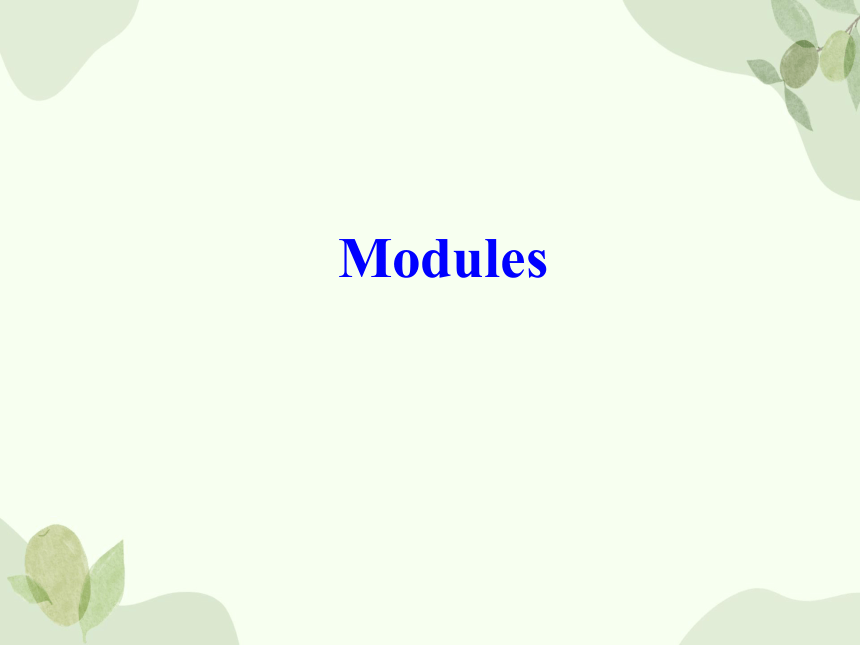
|
|
| 格式 | ppt | ||
| 文件大小 | 631.0KB | ||
| 资源类型 | 教案 | ||
| 版本资源 | 外研版 | ||
| 科目 | 英语 | ||
| 更新时间 | 2024-09-29 18:14:17 | ||
图片预览

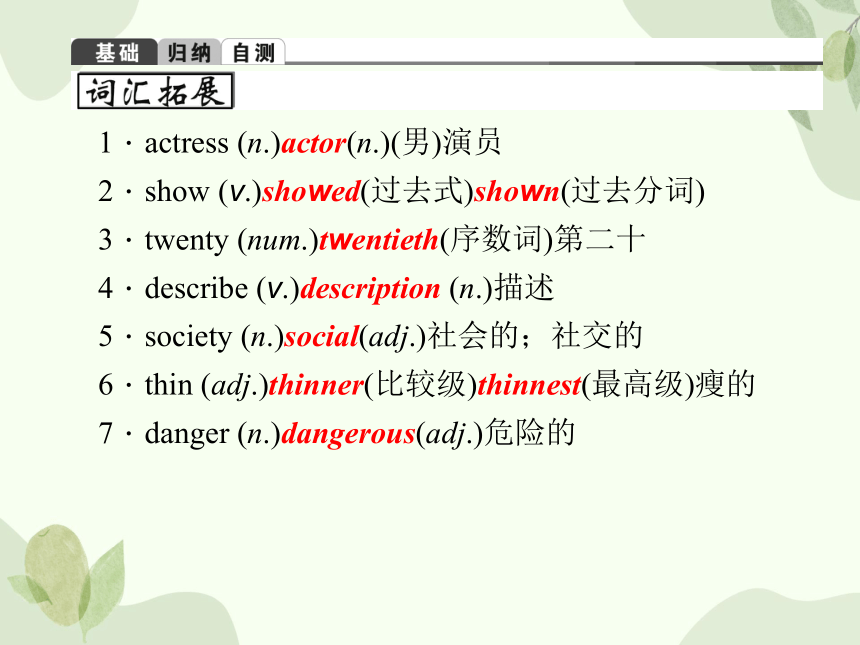
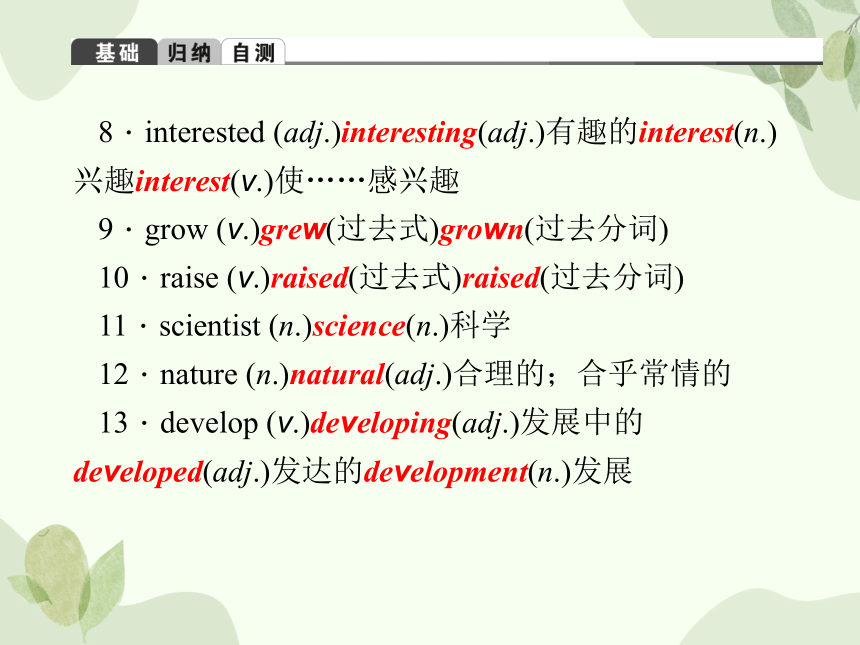
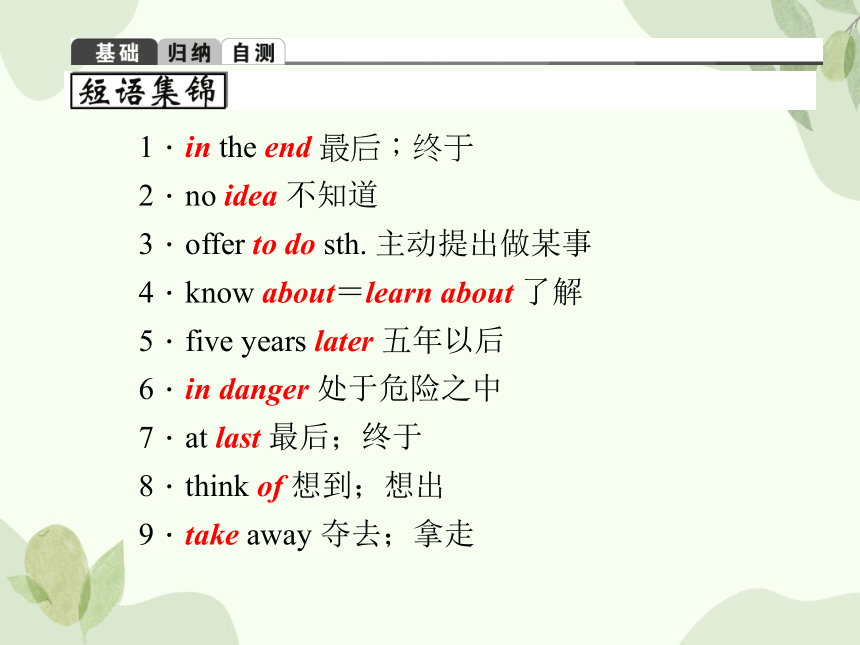
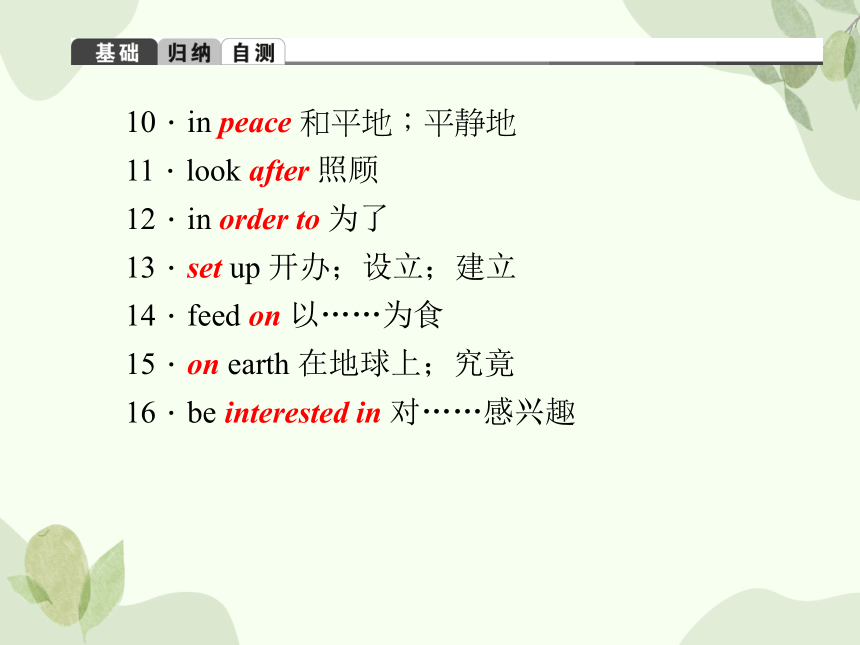
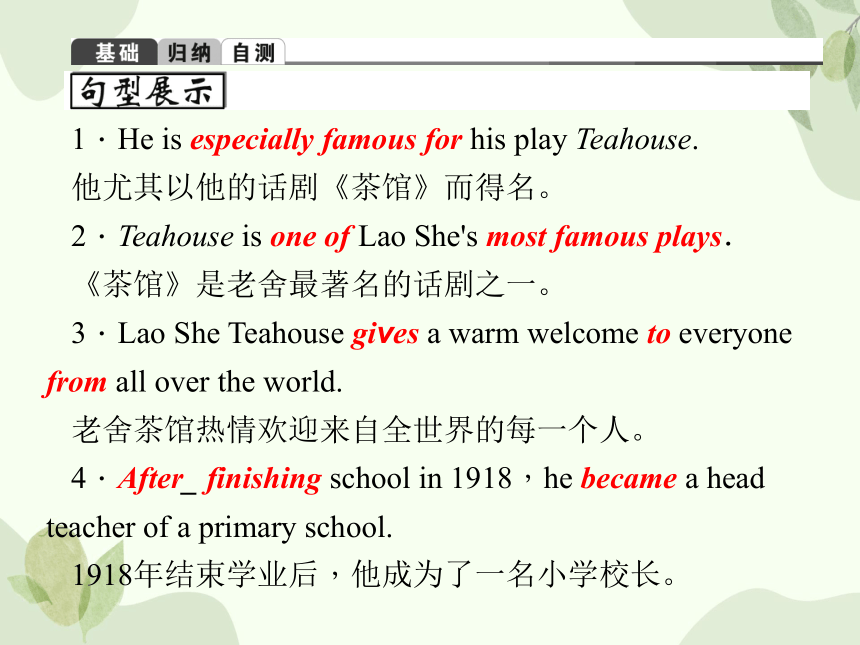
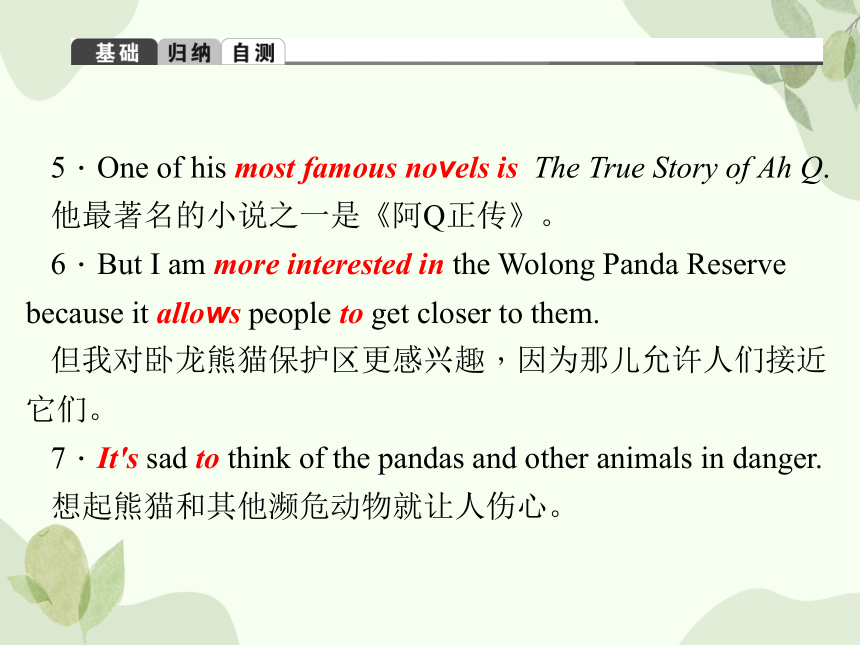
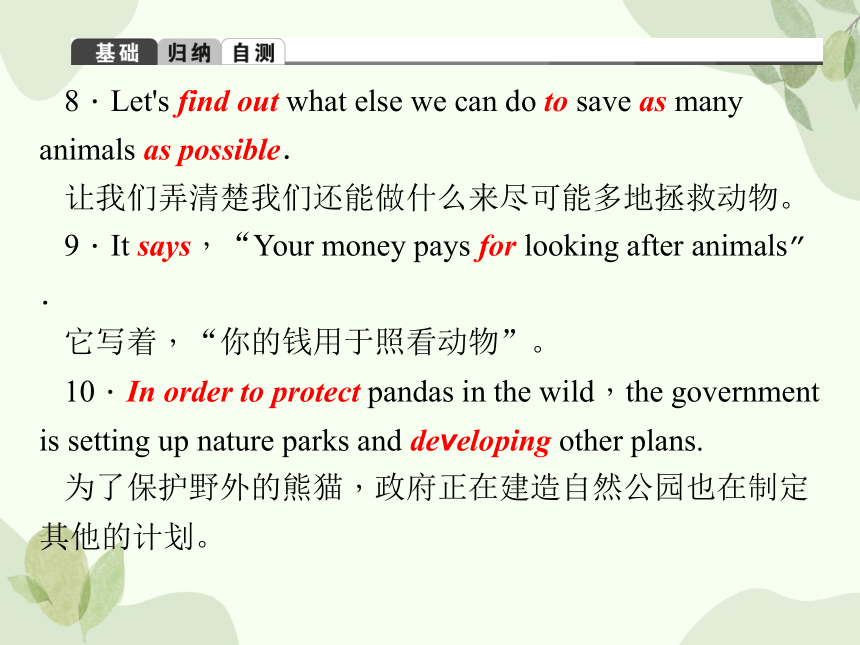

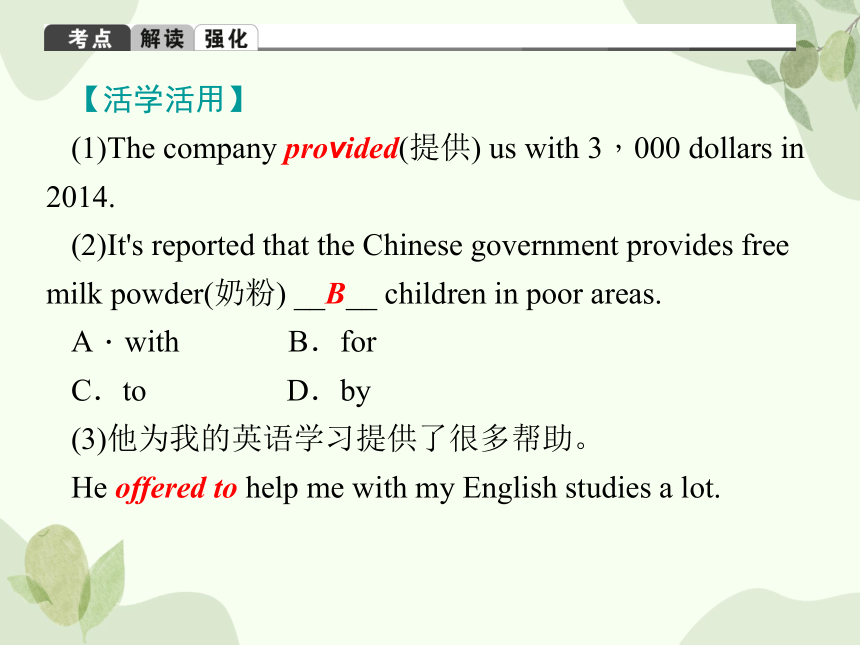
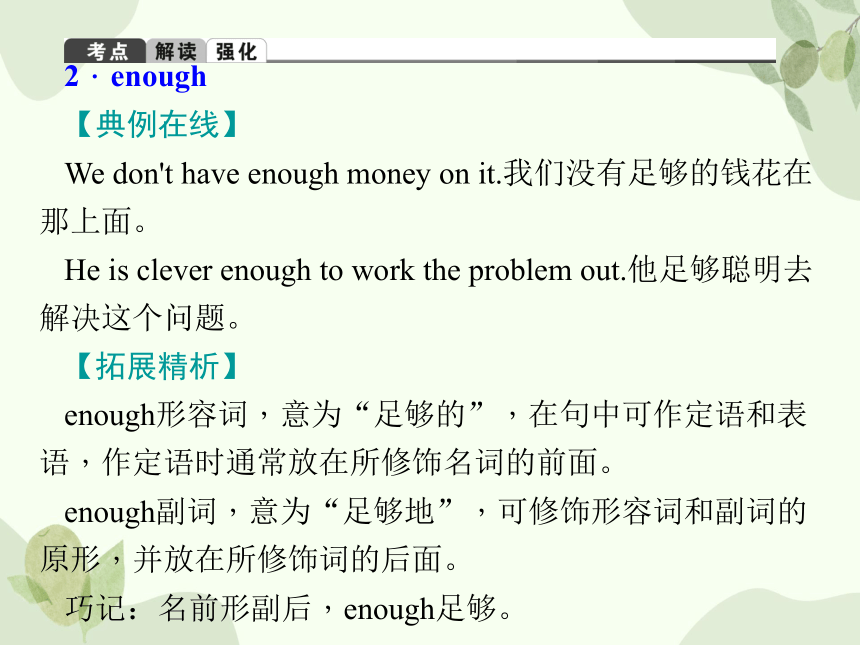
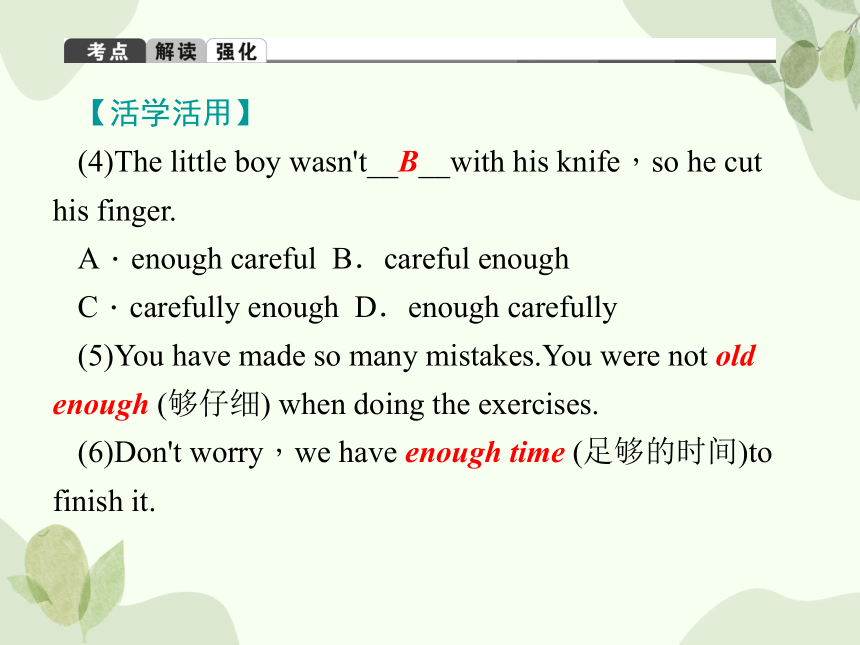
文档简介
(共39张PPT)
Modules
1.actress (n.)actor(n.)(男)演员
2.show (v.)showed(过去式)shown(过去分词)
3.twenty (num.)twentieth(序数词)第二十
4.describe (v.)description (n.)描述
5.society (n.)social(adj.)社会的;社交的
6.thin (adj.)thinner(比较级)thinnest(最高级)瘦的
7.danger (n.)dangerous(adj.)危险的
8.interested (adj.)interesting(adj.)有趣的interest(n.)兴趣interest(v.)使……感兴趣
9.grow (v.)grew(过去式)grown(过去分词)
10.raise (v.)raised(过去式)raised(过去分词)
11.scientist (n.)science(n.)科学
12.nature (n.)natural(adj.)合理的;合乎常情的
13.develop (v.)developing(adj.)发展中的developed(adj.)发达的development(n.)发展
1.in the end 最后;终于
2.no idea 不知道
3.offer to do sth. 主动提出做某事
4.know about=learn about 了解
5.five years later 五年以后
6.in danger 处于危险之中
7.at last 最后;终于
8.think of 想到;想出
9.take away 夺去;拿走
10.in peace 和平地;平静地
11.look after 照顾
12.in order to 为了
13.set up 开办;设立;建立
14.feed on 以……为食
15.on earth 在地球上;究竟
16.be interested in 对……感兴趣
1.He is especially famous for his play Teahouse.
他尤其以他的话剧《茶馆》而得名。
2.Teahouse is one of Lao She's most famous plays.
《茶馆》是老舍最著名的话剧之一。
3.Lao She Teahouse gives a warm welcome to everyone from all over the world.
老舍茶馆热情欢迎来自全世界的每一个人。
4.After_ finishing school in 1918,he became a head teacher of a primary school.
1918年结束学业后,他成为了一名小学校长。
5.One of his most famous novels is The True Story of Ah Q.
他最著名的小说之一是《阿Q正传》。
6.But I am more interested in the Wolong Panda Reserve because it allows people to get closer to them.
但我对卧龙熊猫保护区更感兴趣,因为那儿允许人们接近它们。
7.It's sad to think of the pandas and other animals in danger.
想起熊猫和其他濒危动物就让人伤心。
8.Let's find out what else we can do to save as many animals as possible.
让我们弄清楚我们还能做什么来尽可能多地拯救动物。
9.It says,“Your money pays for looking after animals”.
它写着,“你的钱用于照看动物”。
10.In order to protect pandas in the wild,the government is setting up nature parks and developing other plans.
为了保护野外的熊猫,政府正在建造自然公园也在制定其他的计划。
1.offer
【典例在线】
Lingling offered to take me there.玲玲提议带我去那儿。
His mother offered a good plan for our holiday.他的母亲给我们的假期提出了一个好计划。
You should offer others your help.=You should offer your help to others.你应当主动帮助别人。
【拓展精析】
offer是动词,意为“提议,提出”,常用于offer sth.(提出某事),offer to do sth.(主动提出做某事)。offer也有“提供,给予”的意思,相当于give。offer sb. sth.=offer sth. to sb.意为“向某人提供……”。其近义词是provide(提供),但用法不同,provide sb. with sth.=provide sth. for sb.表示“向某人提供……”。
【活学活用】
(1)The company provided(提供) us with 3,000 dollars in 2014.
(2)It's reported that the Chinese government provides free milk powder(奶粉) __B__ children in poor areas.
A.with B.for
C.to D.by
(3)他为我的英语学习提供了很多帮助。
He offered to help me with my English studies a lot.
2.enough
【典例在线】
We don't have enough money on it.我们没有足够的钱花在那上面。
He is clever enough to work the problem out.他足够聪明去解决这个问题。
【拓展精析】
enough形容词,意为“足够的”,在句中可作定语和表语,作定语时通常放在所修饰名词的前面。
enough副词,意为“足够地”,可修饰形容词和副词的原形,并放在所修饰词的后面。
巧记:名前形副后,enough足够。
【活学活用】
(4)The little boy wasn't__B__with his knife,so he cut his finger.
A.enough careful B.careful enough
C.carefully enough D.enough carefully
(5)You have made so many mistakes.You were not old enough (够仔细) when doing the exercises.
(6)Don't worry,we have enough time (足够的时间)to finish it.
3.in danger
【典例在线】
Do most people want to help animals in danger
大部分人都想帮助濒临灭绝的动物吗?
【拓展精析】
in danger是一个介词短语,意思是“有危险,处于危险中”,在句中通常作表语、定语或状语等。
类似短语:(1)in good health健康的;
(2)in silence沉默的;
(3)in surprise惊奇的。
【活学活用】
(7)We should protect the animals__B__danger.
A.on B.in C.of D.at
(8)He sat there__C__surprise.
A.to B.to his C.in D.on
4.raise
【典例在线】
What has Project Hope raised money for?希望工程为了什么而筹款?
When you want to ask the teacher for help,you should raise your hand.当你想向老师寻求帮助时,你应该举手。
The prices are rising all the time.物价一直在上涨。
【拓展精析】
raise及物动词,意为“筹集、举起、饲养”。如:raise money筹款
rise不及物动词,意为“(某物)举起、上升”。指主语自身移向较高位置。如:
The river rises every spring.每年春天河水都要上涨。
【活学活用】
(9)The famous movie stars had a concert to raise(筹集) money for the earthquake zone.
(10)The sun will rise(升起) again tomorrow.
5.allow
【典例在线】
It allows people to get closer to them.它允许人们更近距离的接近它们。
Miss Jones doesn't allow us to talk loudly here.琼斯女士不允许我们在这儿大声地说话。
It allows taking photos here.这儿允许拍照。
Smoking isn't allowed in public.公共场合不允许抽烟。
【拓展精析】
allow为及物动词“允许”,其用法有:
①allow doing sth.允许做某事;
②allow sb. (not) to do sth.允许某人(不)做某事;
③be allowed to do sth.被允许做某事;
④doing sth. is (not) allowed.做某事(不)被允许。
【活学活用】
(11)—Why don't you watch TV at home?(2014,呼和浩特)
—I'd love to,but my mother doesn't allow me __C__ that.
A.do B.did C.to do D.doing
(12)Keep quiet,please!Talking __A__ during the meeting.(2014,重庆B)
A.is not allowed B.is allowed
C.doesn't allow D.allows
1.It was interesting to learn about the Wolong Panda Reserve.了解卧龙熊猫保护区很有趣。
【典例在线】
It is hard for me to learn English well.对我来说学好英语很难。
It is nice of her to lend her new shoes to you.她把新鞋借给你,她真好。
We need to protect the animals in danger better.我们需要更好地保护濒危动物。
The pandas will have enough places to live in.大熊猫将会有足够的地方去住。
He asked me to rest.他叫我休息。
A plan to stop people killing pandas is now ready.阻止人们杀戮大熊猫的计划现在已准备好。
【拓展精析】
动词不定式的结构:to+动词原形。
动词不定式的用法:
(1)主语。常用句式“it is/was+形容词+to do sth.”来表达,其中it为形式主语,to do sth.为真正主语。
(2)宾语。want,plan,need,agree,offer,decide,refuse,hope等动词后常接不定式做宾语。
(3)宾语补足语。常用短语:ask(tell/warn/want)sb. to do sth.;let,make(使),have,see,watch,hear等动词后常接不带to的不定式做宾补。
(4)定语。注意:不及物动词的不定式与被修饰词有动宾关系时,介词不能省略。
(5)状语及表语。
【活学活用】
(1)Many fast food restaurants paint their walls red,play loud music and have hard seats __B__ customers eat quickly and leave.(2014,杭州)
A.make B.to make C.made D.making
(2)Harry has decided __B__ an online shop after graduation from school.(2014,上海)
A.open B.to open C.opened D.opening
(3)The little girl was crying because her mother didn't allow her __C__ the ice cream.(2014,重庆)
A.eat B.eats C.to eat D.ate
(4)—Why are you so excited today
—We were told __B__ a picnic this weekend.
A.have B.to have C.having D.had
2.in order to...
【典例在线】
In order to protect pandas in the wild,the government is setting up nature parks and developing other plans.为了保护野外的大熊猫,政府正在建立自然保护区和制订其他的计划。
【拓展精析】
in order to+v.原形,意思为“为了……,便于……”,表示做某事的目的。可以放在句末,也可以提到句首。“为了不做某事”可以表达为“in order not to do sth.”。表动作的目的可以有以下几种方法:①for sth.如:Can you come to my home for supper this evening?今晚你能来我家吃晚饭吗?②... to do sth.如:The government is setting up nature parks to protect pandas in the wild.政府正设立自然保护区保护野生熊猫。③in order to/so as to+v.原形,但so as to+v.原形表目的不能放在句首。④in order that+句子和so that+句子。如:He got up early this morning in order that/so that he could arrive at the airport on time.为了按时到达机场他今天早上起床很早。
【活学活用】
(5)In order __A__ for the meeting,my sister forced herself to get up early this morning.(2014,广东)
A.not to be late B.not being late
C.to be late D.being late
(6)为了让我们的学校更加美丽,我们打算在学校周围种植更多的树木和花草。(2014,黄石)
We'll plant more trees and flowers around our school in order to make it more beautiful.
(7)In order to catch up with other students,he often stays up.(同义句改写)
He often stays up so that he can catch up with other students.
3.one of...
【典例在线】
Lao She is one of China's greatest writers.老舍是中国最伟大的作家之一。
One of his most famous stories is The True Story of Ah Q.他最著名的小说之一是《阿Q正传》。
【拓展精析】
one of...表示“……中的一个,……之一”,one of后接名词或代词,注意名词或代词要用复数形式,名词还要特指,有形容词修饰名词时,往往要用其最高级。one of...作主语时,其谓语动词要用第三人称单数。
【活学活用】
(8)One of my friends __A__ moved to America.I miss her so much.
A.has B.have C.is D.are
(9)Mo Yan is one of __D__ writers in the world.(2014,天津)
A.famous B.more famous
C.most famous D.the most famous
1.at the end of,in the end,by the end of
【典例在线】
At the end of this term,we will have a big exam.这学期结束时我们将有一次大型考试。
They succeeded in the end.他们最后成功了。
We had learned 500 words by the end of last month.至上个月底,我们已经学习了500个单词。
【拓展精析】
at the end of在……末端,在……结束时。既表示时间又表示位置。
in the end最终,最后,相当于at last或finally。
by the end of到……末,到……末为止,主要表示时间。常用于完成时。
【活学活用】
(1)You will see the post office__B__the road.
A.in the end B.at the end of
C.by the end of D.in the end of
(2)By the end of last week,she __D__ in the east of China for two months helping the homeless children.(2014,上海)
A.will stay B.has stayed
C.would stay D.had stayed
(3)__D__,they reached a place of safety.
A.On the end B.At the end
C.By the end D.In the end
2.interested,interesting
【典例在线】
Lucy is interested in Beijing Opera.露西对京剧感兴趣。
Lost in Thailand is a very interesting film.《泰囧》是一部非常有趣的电影。
【拓展精析】
interested为形容词,意为“感兴趣的”,常用来修饰人,常见短语有:be interested in对……感兴趣的;interesting为形容词,意为“有趣的”,常用来修饰物。
【活学活用】
(4)Many students think it __B__ to learn English by reading news.
A.interest B.interesting
C.interested D.interests
(5)Most foreign visitors are very interested(感兴趣) in Chinese traditional culture.(2014,济宁)
1.Drivers shouldn't be allowed __C__ after drinking,or they will break the law.
A.drive B.driving
C.to drive D.to be driven
2.The local people like that Halian restaurant because it __D__ both delicious food and good service.
A.uses B.wants C.shares D.provides
3.Whenever I am in trouble,Lucy is always one of __D__ friends.
A.helpful B.more helpful
C.most helpful D.the most helpful
4.—Do you know who invented Chinese chess
—Sorry.I don't know.Let's __B__ the Internet ____.
A.search;find out it B.search;to find it out
C.to search;to find out it D.to search;find it out
5.I always tell my students __A__ on the road because it's really dangerous.
A.not to play B.to play not
C.not playing D.not play
6.When you leave,please turn off the light __D__ energy.(2014,天津)
A.save B.saving C.saved D.to save
7.¥80 __A__enough,it means you didn't work ______.
A.is;hard enough B.is;enough hard
C.are;hard enough D.are;enough hard
8.Mr Wang is one of the most popular teachers(teacher) in our school.
9.We should try to help the_people_in_danger(遇到危险的人).
10.Wish(祝愿) you good luck.
书信类写作
英语书信一般分为信头、信内地址、称呼、正文、结束语以及签名等。
一、书信类写作注意事项
1.信头:信头指写信人的地址和写信日期,通常写在信纸的右上角。写信头时一般先写地址,后写日期。写地址应从小到大排列,如门牌号码、街道名、市名、省名、国名。邮政编码一般写在省市名称之后。写信日期位于写信人地址之后。
2.信内地址:信内地址是收信人的地址,写法同上。信内地址通常写在左手边,在日期线和称呼之间。在公务信件中要写明这一项,在私人信件中,这一项常省略。
3.称呼:称呼是对收信人的称谓,通常在收信人地址下面两行处写,与收信人地址齐头。
4.正文:正文是书信的主体部分。一般来说,书信正文的首行与称呼这一行要留出一行的距离。
5.结束语:英文书信中的结束语相当于我们通常用的客套话,它位于正文之后。结束语一般单独成行,可写在信笺中间(居中),也可从中间起向右写。常见的结束语有:Best wishes!/With best regards!/I wish you success./Good luck./I'm looking forward to hearing from you soon.谦称有尊卑亲疏之分,要与收信人的称呼相一致。写给亲友常用Yours,/Forever yours,/Your sincerely等。
6.签名:签名即写信人的姓名。签名的位置是在谦称和结束语下面一行至两行处。除了对熟悉的人或亲密的人以外,签名必须写全姓名。
二、常见写作表达
1.Thank you for your letter. 谢谢你的来信。
2.I was so glad/pleased/happy to receive your letter. 很高兴收到你的来信。
3.How is everything going?一切安好?
4.How are you these days?近况如何?
5.I am sorry that I have not written to you for such a long time. 抱歉,很久没给你写信了。
6.I'm looking forward to hearing from you soon. 盼望你的回信。
7.Send my love to/Please give my regards to... 请代我向……问好。
8.Write to me soon. 尽快给我写信。
三、经典范文展示
你的笔友萨米想了解你这两天的考试情况以及暑期安排。假定你是陈涛,请根据萨米在电子邮件中的提问,给他写回信。80词左右。
Dear Chen Tao,
How are you?I know you're busy with your English exam right now.How is it?And how was everything yesterday?Anyway,it'll be all over soon.What are you going to do during the summer vacation?And are you ready for your new school life?Please email me and let me know.
Sammy
【美文欣赏】
Dear Sammy,
Thanks for your letter.You know we are busy with our Entrance Examination to the Senior High School.
It was all right yesterday.I got ready for my English exam and relaxed myself yesterday evening.I took a walk with my parents after dinner.And my parents cooked some delicious food for me.
Modules
1.actress (n.)actor(n.)(男)演员
2.show (v.)showed(过去式)shown(过去分词)
3.twenty (num.)twentieth(序数词)第二十
4.describe (v.)description (n.)描述
5.society (n.)social(adj.)社会的;社交的
6.thin (adj.)thinner(比较级)thinnest(最高级)瘦的
7.danger (n.)dangerous(adj.)危险的
8.interested (adj.)interesting(adj.)有趣的interest(n.)兴趣interest(v.)使……感兴趣
9.grow (v.)grew(过去式)grown(过去分词)
10.raise (v.)raised(过去式)raised(过去分词)
11.scientist (n.)science(n.)科学
12.nature (n.)natural(adj.)合理的;合乎常情的
13.develop (v.)developing(adj.)发展中的developed(adj.)发达的development(n.)发展
1.in the end 最后;终于
2.no idea 不知道
3.offer to do sth. 主动提出做某事
4.know about=learn about 了解
5.five years later 五年以后
6.in danger 处于危险之中
7.at last 最后;终于
8.think of 想到;想出
9.take away 夺去;拿走
10.in peace 和平地;平静地
11.look after 照顾
12.in order to 为了
13.set up 开办;设立;建立
14.feed on 以……为食
15.on earth 在地球上;究竟
16.be interested in 对……感兴趣
1.He is especially famous for his play Teahouse.
他尤其以他的话剧《茶馆》而得名。
2.Teahouse is one of Lao She's most famous plays.
《茶馆》是老舍最著名的话剧之一。
3.Lao She Teahouse gives a warm welcome to everyone from all over the world.
老舍茶馆热情欢迎来自全世界的每一个人。
4.After_ finishing school in 1918,he became a head teacher of a primary school.
1918年结束学业后,他成为了一名小学校长。
5.One of his most famous novels is The True Story of Ah Q.
他最著名的小说之一是《阿Q正传》。
6.But I am more interested in the Wolong Panda Reserve because it allows people to get closer to them.
但我对卧龙熊猫保护区更感兴趣,因为那儿允许人们接近它们。
7.It's sad to think of the pandas and other animals in danger.
想起熊猫和其他濒危动物就让人伤心。
8.Let's find out what else we can do to save as many animals as possible.
让我们弄清楚我们还能做什么来尽可能多地拯救动物。
9.It says,“Your money pays for looking after animals”.
它写着,“你的钱用于照看动物”。
10.In order to protect pandas in the wild,the government is setting up nature parks and developing other plans.
为了保护野外的熊猫,政府正在建造自然公园也在制定其他的计划。
1.offer
【典例在线】
Lingling offered to take me there.玲玲提议带我去那儿。
His mother offered a good plan for our holiday.他的母亲给我们的假期提出了一个好计划。
You should offer others your help.=You should offer your help to others.你应当主动帮助别人。
【拓展精析】
offer是动词,意为“提议,提出”,常用于offer sth.(提出某事),offer to do sth.(主动提出做某事)。offer也有“提供,给予”的意思,相当于give。offer sb. sth.=offer sth. to sb.意为“向某人提供……”。其近义词是provide(提供),但用法不同,provide sb. with sth.=provide sth. for sb.表示“向某人提供……”。
【活学活用】
(1)The company provided(提供) us with 3,000 dollars in 2014.
(2)It's reported that the Chinese government provides free milk powder(奶粉) __B__ children in poor areas.
A.with B.for
C.to D.by
(3)他为我的英语学习提供了很多帮助。
He offered to help me with my English studies a lot.
2.enough
【典例在线】
We don't have enough money on it.我们没有足够的钱花在那上面。
He is clever enough to work the problem out.他足够聪明去解决这个问题。
【拓展精析】
enough形容词,意为“足够的”,在句中可作定语和表语,作定语时通常放在所修饰名词的前面。
enough副词,意为“足够地”,可修饰形容词和副词的原形,并放在所修饰词的后面。
巧记:名前形副后,enough足够。
【活学活用】
(4)The little boy wasn't__B__with his knife,so he cut his finger.
A.enough careful B.careful enough
C.carefully enough D.enough carefully
(5)You have made so many mistakes.You were not old enough (够仔细) when doing the exercises.
(6)Don't worry,we have enough time (足够的时间)to finish it.
3.in danger
【典例在线】
Do most people want to help animals in danger
大部分人都想帮助濒临灭绝的动物吗?
【拓展精析】
in danger是一个介词短语,意思是“有危险,处于危险中”,在句中通常作表语、定语或状语等。
类似短语:(1)in good health健康的;
(2)in silence沉默的;
(3)in surprise惊奇的。
【活学活用】
(7)We should protect the animals__B__danger.
A.on B.in C.of D.at
(8)He sat there__C__surprise.
A.to B.to his C.in D.on
4.raise
【典例在线】
What has Project Hope raised money for?希望工程为了什么而筹款?
When you want to ask the teacher for help,you should raise your hand.当你想向老师寻求帮助时,你应该举手。
The prices are rising all the time.物价一直在上涨。
【拓展精析】
raise及物动词,意为“筹集、举起、饲养”。如:raise money筹款
rise不及物动词,意为“(某物)举起、上升”。指主语自身移向较高位置。如:
The river rises every spring.每年春天河水都要上涨。
【活学活用】
(9)The famous movie stars had a concert to raise(筹集) money for the earthquake zone.
(10)The sun will rise(升起) again tomorrow.
5.allow
【典例在线】
It allows people to get closer to them.它允许人们更近距离的接近它们。
Miss Jones doesn't allow us to talk loudly here.琼斯女士不允许我们在这儿大声地说话。
It allows taking photos here.这儿允许拍照。
Smoking isn't allowed in public.公共场合不允许抽烟。
【拓展精析】
allow为及物动词“允许”,其用法有:
①allow doing sth.允许做某事;
②allow sb. (not) to do sth.允许某人(不)做某事;
③be allowed to do sth.被允许做某事;
④doing sth. is (not) allowed.做某事(不)被允许。
【活学活用】
(11)—Why don't you watch TV at home?(2014,呼和浩特)
—I'd love to,but my mother doesn't allow me __C__ that.
A.do B.did C.to do D.doing
(12)Keep quiet,please!Talking __A__ during the meeting.(2014,重庆B)
A.is not allowed B.is allowed
C.doesn't allow D.allows
1.It was interesting to learn about the Wolong Panda Reserve.了解卧龙熊猫保护区很有趣。
【典例在线】
It is hard for me to learn English well.对我来说学好英语很难。
It is nice of her to lend her new shoes to you.她把新鞋借给你,她真好。
We need to protect the animals in danger better.我们需要更好地保护濒危动物。
The pandas will have enough places to live in.大熊猫将会有足够的地方去住。
He asked me to rest.他叫我休息。
A plan to stop people killing pandas is now ready.阻止人们杀戮大熊猫的计划现在已准备好。
【拓展精析】
动词不定式的结构:to+动词原形。
动词不定式的用法:
(1)主语。常用句式“it is/was+形容词+to do sth.”来表达,其中it为形式主语,to do sth.为真正主语。
(2)宾语。want,plan,need,agree,offer,decide,refuse,hope等动词后常接不定式做宾语。
(3)宾语补足语。常用短语:ask(tell/warn/want)sb. to do sth.;let,make(使),have,see,watch,hear等动词后常接不带to的不定式做宾补。
(4)定语。注意:不及物动词的不定式与被修饰词有动宾关系时,介词不能省略。
(5)状语及表语。
【活学活用】
(1)Many fast food restaurants paint their walls red,play loud music and have hard seats __B__ customers eat quickly and leave.(2014,杭州)
A.make B.to make C.made D.making
(2)Harry has decided __B__ an online shop after graduation from school.(2014,上海)
A.open B.to open C.opened D.opening
(3)The little girl was crying because her mother didn't allow her __C__ the ice cream.(2014,重庆)
A.eat B.eats C.to eat D.ate
(4)—Why are you so excited today
—We were told __B__ a picnic this weekend.
A.have B.to have C.having D.had
2.in order to...
【典例在线】
In order to protect pandas in the wild,the government is setting up nature parks and developing other plans.为了保护野外的大熊猫,政府正在建立自然保护区和制订其他的计划。
【拓展精析】
in order to+v.原形,意思为“为了……,便于……”,表示做某事的目的。可以放在句末,也可以提到句首。“为了不做某事”可以表达为“in order not to do sth.”。表动作的目的可以有以下几种方法:①for sth.如:Can you come to my home for supper this evening?今晚你能来我家吃晚饭吗?②... to do sth.如:The government is setting up nature parks to protect pandas in the wild.政府正设立自然保护区保护野生熊猫。③in order to/so as to+v.原形,但so as to+v.原形表目的不能放在句首。④in order that+句子和so that+句子。如:He got up early this morning in order that/so that he could arrive at the airport on time.为了按时到达机场他今天早上起床很早。
【活学活用】
(5)In order __A__ for the meeting,my sister forced herself to get up early this morning.(2014,广东)
A.not to be late B.not being late
C.to be late D.being late
(6)为了让我们的学校更加美丽,我们打算在学校周围种植更多的树木和花草。(2014,黄石)
We'll plant more trees and flowers around our school in order to make it more beautiful.
(7)In order to catch up with other students,he often stays up.(同义句改写)
He often stays up so that he can catch up with other students.
3.one of...
【典例在线】
Lao She is one of China's greatest writers.老舍是中国最伟大的作家之一。
One of his most famous stories is The True Story of Ah Q.他最著名的小说之一是《阿Q正传》。
【拓展精析】
one of...表示“……中的一个,……之一”,one of后接名词或代词,注意名词或代词要用复数形式,名词还要特指,有形容词修饰名词时,往往要用其最高级。one of...作主语时,其谓语动词要用第三人称单数。
【活学活用】
(8)One of my friends __A__ moved to America.I miss her so much.
A.has B.have C.is D.are
(9)Mo Yan is one of __D__ writers in the world.(2014,天津)
A.famous B.more famous
C.most famous D.the most famous
1.at the end of,in the end,by the end of
【典例在线】
At the end of this term,we will have a big exam.这学期结束时我们将有一次大型考试。
They succeeded in the end.他们最后成功了。
We had learned 500 words by the end of last month.至上个月底,我们已经学习了500个单词。
【拓展精析】
at the end of在……末端,在……结束时。既表示时间又表示位置。
in the end最终,最后,相当于at last或finally。
by the end of到……末,到……末为止,主要表示时间。常用于完成时。
【活学活用】
(1)You will see the post office__B__the road.
A.in the end B.at the end of
C.by the end of D.in the end of
(2)By the end of last week,she __D__ in the east of China for two months helping the homeless children.(2014,上海)
A.will stay B.has stayed
C.would stay D.had stayed
(3)__D__,they reached a place of safety.
A.On the end B.At the end
C.By the end D.In the end
2.interested,interesting
【典例在线】
Lucy is interested in Beijing Opera.露西对京剧感兴趣。
Lost in Thailand is a very interesting film.《泰囧》是一部非常有趣的电影。
【拓展精析】
interested为形容词,意为“感兴趣的”,常用来修饰人,常见短语有:be interested in对……感兴趣的;interesting为形容词,意为“有趣的”,常用来修饰物。
【活学活用】
(4)Many students think it __B__ to learn English by reading news.
A.interest B.interesting
C.interested D.interests
(5)Most foreign visitors are very interested(感兴趣) in Chinese traditional culture.(2014,济宁)
1.Drivers shouldn't be allowed __C__ after drinking,or they will break the law.
A.drive B.driving
C.to drive D.to be driven
2.The local people like that Halian restaurant because it __D__ both delicious food and good service.
A.uses B.wants C.shares D.provides
3.Whenever I am in trouble,Lucy is always one of __D__ friends.
A.helpful B.more helpful
C.most helpful D.the most helpful
4.—Do you know who invented Chinese chess
—Sorry.I don't know.Let's __B__ the Internet ____.
A.search;find out it B.search;to find it out
C.to search;to find out it D.to search;find it out
5.I always tell my students __A__ on the road because it's really dangerous.
A.not to play B.to play not
C.not playing D.not play
6.When you leave,please turn off the light __D__ energy.(2014,天津)
A.save B.saving C.saved D.to save
7.¥80 __A__enough,it means you didn't work ______.
A.is;hard enough B.is;enough hard
C.are;hard enough D.are;enough hard
8.Mr Wang is one of the most popular teachers(teacher) in our school.
9.We should try to help the_people_in_danger(遇到危险的人).
10.Wish(祝愿) you good luck.
书信类写作
英语书信一般分为信头、信内地址、称呼、正文、结束语以及签名等。
一、书信类写作注意事项
1.信头:信头指写信人的地址和写信日期,通常写在信纸的右上角。写信头时一般先写地址,后写日期。写地址应从小到大排列,如门牌号码、街道名、市名、省名、国名。邮政编码一般写在省市名称之后。写信日期位于写信人地址之后。
2.信内地址:信内地址是收信人的地址,写法同上。信内地址通常写在左手边,在日期线和称呼之间。在公务信件中要写明这一项,在私人信件中,这一项常省略。
3.称呼:称呼是对收信人的称谓,通常在收信人地址下面两行处写,与收信人地址齐头。
4.正文:正文是书信的主体部分。一般来说,书信正文的首行与称呼这一行要留出一行的距离。
5.结束语:英文书信中的结束语相当于我们通常用的客套话,它位于正文之后。结束语一般单独成行,可写在信笺中间(居中),也可从中间起向右写。常见的结束语有:Best wishes!/With best regards!/I wish you success./Good luck./I'm looking forward to hearing from you soon.谦称有尊卑亲疏之分,要与收信人的称呼相一致。写给亲友常用Yours,/Forever yours,/Your sincerely等。
6.签名:签名即写信人的姓名。签名的位置是在谦称和结束语下面一行至两行处。除了对熟悉的人或亲密的人以外,签名必须写全姓名。
二、常见写作表达
1.Thank you for your letter. 谢谢你的来信。
2.I was so glad/pleased/happy to receive your letter. 很高兴收到你的来信。
3.How is everything going?一切安好?
4.How are you these days?近况如何?
5.I am sorry that I have not written to you for such a long time. 抱歉,很久没给你写信了。
6.I'm looking forward to hearing from you soon. 盼望你的回信。
7.Send my love to/Please give my regards to... 请代我向……问好。
8.Write to me soon. 尽快给我写信。
三、经典范文展示
你的笔友萨米想了解你这两天的考试情况以及暑期安排。假定你是陈涛,请根据萨米在电子邮件中的提问,给他写回信。80词左右。
Dear Chen Tao,
How are you?I know you're busy with your English exam right now.How is it?And how was everything yesterday?Anyway,it'll be all over soon.What are you going to do during the summer vacation?And are you ready for your new school life?Please email me and let me know.
Sammy
【美文欣赏】
Dear Sammy,
Thanks for your letter.You know we are busy with our Entrance Examination to the Senior High School.
It was all right yesterday.I got ready for my English exam and relaxed myself yesterday evening.I took a walk with my parents after dinner.And my parents cooked some delicious food for me.
同课章节目录
- Module 1 How to learn English
- Unit 1 Let's try to speak English as much as possi
- Unit 2 You should smile at her.
- Unit 3 Language in use .
- Module 2 My home town and my country
- Unit 1 It's taller than many other buildings.
- Unit 2 Cambridge is a beautiful city in the east o
- Unit 3 Language in use .
- Module 3 Sports.
- Unit 1 Nothing is more exciting than playing tenni
- Unit 2 This year we training more carefully.
- Unit 3 Language in use .
- Module 4 Planes, ships and trains .
- Unit 1 He lives the farthest from school.
- Unit 2 What is the best way to travel.
- Unit 3 Language in use .
- Module 5 Lao She Teahouse.
- Unit 1 I wanted to see the Beijing Opera.
- Unit 2 It descibes the changes in Chinese society.
- Unit 3 Language in use .
- Module 6 Animals in danger.
- Unit 1 It allows people to get closer to them .
- Unit 2 The WWF is working hard to save them all.
- Unit 3 Language in use .
- Revision module A
- Module 7 A famous story
- Unit 1 Alice was sitting with her sister by the ri
- Unit 2 She was thinking about her cat.
- Unit 3 Language in use .
- Module 8 Accidents
- Unit 1 While the car were changing to red, a car s
- Unit 2 I was trying to pick it up when it bite me
- Unit 3 Language in use .
- Module 9 Population
- Unit 1 The population of China is about 1.37 billi
- Unit 2 Arnwick was a city with 200,000 people.
- Unit 3 Language in use .
- Module 10 The weathe
- Unit 1 It might snow.
- Unit 2 The weather is fine all year round.
- Unit 3 Language in use .
- Module 11 Way of life
- Unit 1 In China ,we open a gift later.
- Unit 2 In England, you usually drink tea with milk
- Unit 3 Language in use .
- Module 12 Help
- Unit 1 What should we do before help arrives?
- Unit 2 Stay away from windows and heavy furniture.
- Unit 3 Language in use .
- Revision module B
